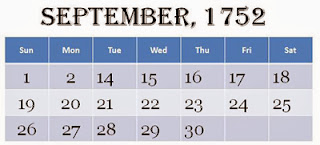In 1752, the Gregorian calendar was introduced in the British Empire, which included the American colonies. This change was made to align the calendar with the solar year more accurately. As a result, the calendar was adjusted by skipping 11 days in September, with September 2nd being followed by September 14th.
The introduction of the Gregorian calendar also changed the way leap years were calculated. Under the Julian calendar, leap years were every 4 years, but under the Gregorian calendar, leap years are skipped on century years unless they are divisible by 400. This change was made to make the calendar more in line with the actual length of the solar year.
1752 Calendar September Month
Significance of September in 1752
September in 1752 was a significant month due to the calendar change. The missing 11 days caused confusion and disruption, with many people unsure of the correct date. In addition, some people protested the change, believing it to be a conspiracy or a religious issue. However, over time, the Gregorian calendar became widely accepted and is now the standard calendar used in most countries around the world.
Despite the initial confusion and resistance, the Gregorian calendar has proven to be more accurate and efficient in tracking time. September in 1752 serves as a reminder of the importance of adjusting calendars to reflect the natural rhythms of the Earth and the solar system.
